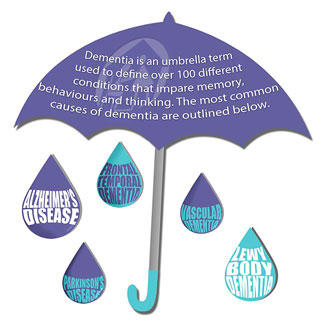What is Dementia?
Dementia is an umbrella term used to describe a collection of symptoms that affect the brain; it is not one specific disease.
Dementia is not a clinical diagnosis itself until an underlying disease has been identified. Dementia affects thinking, behaviour and the ability to perform everyday tasks. Alzheimer’s disease is the well-known and most common form of dementia.
Who gets dementia?
Most people with dementia are older, but it is important to know that not all elderly people get a form of dementia. Dementia is not a normal part of ageing. It can happen to anybody, but it is more common after the age of 65 years. People in their 40s and 50s can also have young onset dementia.
What causes dementia?
There are many different forms of dementia (over 50) and each has its own cause.
The most common types of dementia are:
Alzheimer’s disease – during the course of the disease the chemistry and structure of the brain changes, leading to the death of brain cells. Problems with short term memory is usually the first sign.
Vascular dementia – If the oxygen supply to the brain fails due to vascular disease, brain cells are likely to die and this can cause symptoms of vascular dementia. These symptoms can occur either suddenly, following a stroke, or over time through a series of small strokes.

What are the 10 signs of dementia?
- Loss of memory – particularly affects short term memory, for example forgetting what happened earlier in the day, not being able to recall conversations, being repetitive or forgetting the way home from the shops. Long term memory usually remains quite good.
- Mood changes – people with dementia may become frightened, agitated, withdrawn, sad and/or angry about what is happening to them. More often than not they experience a deep sense of loss, in many cases this leads to anxiety and depression. Moods may fluctuate and change from day to day.
- Communication problems – Often finding the right words to say becomes an issue and can become extremely frustrating for the person with dementia. Describing the function of an item instead of naming it is a common example.
The fact that a parent cannot find the correct name for someone should not be taken as ‘they don’t know who I am’. Often they know exactly who you are, they just can’t connect to the part of their brain holding your name, often they will say a name of someone they love (e.g. Mom or Sister).
If you want to learn about the 7 other signs, please sign up to our newsletter located at the bottom of the right panel.
Parkinson’s disease; dementia with Lewy Bodies – these forms of dementia gets their name from tiny abnormal structures (lewy bodies) that develop inside nerve cells. Their presence in the brain leads to degeneration of brain tissue. This form of dementia shares some of the characteristics of Parkinson’s disease.
Frontal – temporal dementia – frontal temporal lobar degeneration (FTLD) examples are; Huntington’s disease, Alcohol related dementia (Korsakoff’s syndrome) and Creutzfeldt-Jacob disease (Mad cow disease).
For most forms of dementia, personality and behavioural changes are the most common signs.
Prognosis
As dementia progresses they usually become worse, the person will often have problems carrying out everyday tasks and will become increasingly dependent on other people. Although there is no cure for dementia, symptoms can be relieved and behaviours modified through a range of interventions and therapies such as: having a routine, enabling in home elder care, mind and body exercises, music and reminiscence therapy (e.g. looking at old photos, talking about happy times in their life), support groups, respite programs, washing, reassurance, diversion and lifestyle changes. In a very small number of cases medication may be required.
Daughterly Care Hourly Caregivers and Live in Carers can create a safe, supportive, and healthy home environment for loved ones with a form of dementia by following a few simple guidelines:
- Communicate clearly and slowly, using gestures when appropriate (most communication is body gestures not verbal);
- Encourage regular exercise and a healthy lifestyle;
- Anticipate your loved one’s needs;
- Help manage physical and behavioural problems;
- Make use of reminders, notes, regular routines and rituals to aid memory;
- Take care of the carer – seek out support or counseling as needed. Having regular respite breaks is also critical;
- Join a primary carer support group as you can learn a lot from your peers especially if they are ahead on their journey.

The Daughterly Care Joyful Living Approach™
Daughterly Care has an excellent reputation for providing high quality dementia care at home. This is achieved by tailoring our private care provision to suit each individual client in a holistic manner. Our aim is to enable our clients to maintain full control of their Consumer Directed Care so it fits around their chosen lifestyle preferences. Each care plan is tailored to our private care client’s unique requirements and we review each elderly person’s care plan as needs change.
Although some of the symptoms of dementia are common to many people, each elderly person’s experience of the illness will be different. Our 24hr Nurses and Hourly Caregivers and Live in Carers are trained in best practice of dementia care delivery and have extensive experience in what to expect and how to act as the condition progresses.
Daughterly Care employs accredited trainers in dementia and in home aged care, as well as 24 hour Private Nurses who are available to guide and/or assist our Hourly Carergivers and Live in Carers, clients and their families as the need arises.
As part of our holistic approach to dementia care at home we encourage the support of our private care clients, doctor or G.P., geriatrician, family, friends and wider community and are happy to communicate, advocate and liaise on your behalf.
Information and Support
National Dementia helpline 1800 100 500
Aged Care Assessment Team co-operate from your local public hospital.
31st May 2015
Team Effort by Wendy, Bertie, Carmel and Veronica!!!
“We feel Dad is in a good place at the moment with a familiar routine that is working well. He certainly enjoys the care coming now, for the things they do to organise his day and especially his meals. Beyond that though, he looks forward to the company of someone to talk to each day and he also enjoys the walks they take him on.
Well done and thanks to all at Daughterly Care.”
Son of Mr H

Discover how we care for people living with dementia:
We are dementia care specialists
Music and memory for people living with dementia
Read about other exceptional in home dementia care examples:
More about dementia
Read unsolicited feedback about our Caregivers and Nurses from our clients. We’re always thrilled to receive such kind words.
The next step is easy … contact us for a confidential chat about your needs or to organise your, free no obligation consultation email claireg@daughterlycare.com.au or call us on (02) 9970 7333.
